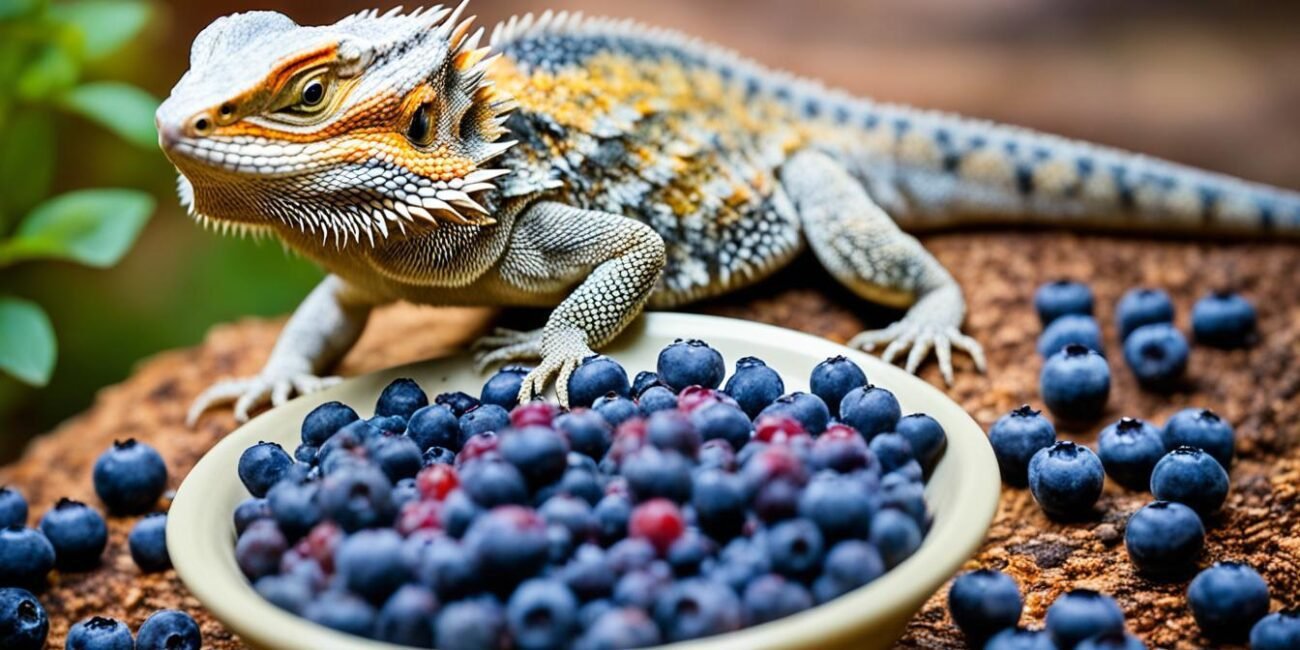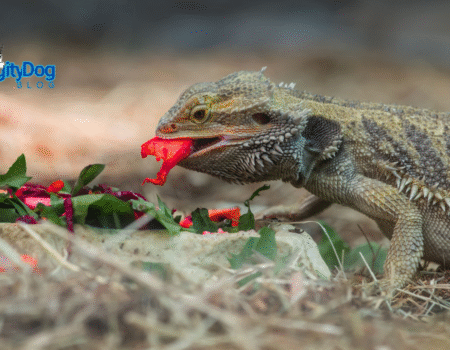“Let food be thy medicine and medicine be thy food.” – Hippocrates
Welcome, reptile enthusiasts! Today, I want to dive into a topic that has been buzzing among bearded dragon owners: can bearded dragons eat blueberries? These little berries are not only delicious but also packed with nutrients. But before you rush off to feed your scaly friend a handful of blueberries, let’s find out if they are safe and beneficial for their diet.
Bearded dragons are unique creatures with specific dietary needs. While blueberries can be a tasty addition to their meals, it’s crucial to understand how they should be incorporated into their diet. In this article, I will explore the nutritional value of blueberries for bearded dragons, their benefits, and precautions you should take when feeding them. So, let’s start unraveling the mystery of blueberries and their safety for our scaly companions!
Key Takeaways:
- Blueberries can be safely incorporated into a bearded dragon’s diet in moderation.
- They offer several nutritional benefits, including antioxidants, carbohydrates, manganese, vitamins C and K1, and hydration.
- Excessive sugar intake and imbalanced phosphorus-to-calcium ratio are the main concerns when feeding blueberries to bearded dragons.
- Frozen blueberries can be a convenient alternative, providing similar nutritional value as fresh ones.
- It’s important to maintain a balanced diet for bearded dragons, focusing on vegetables as the main component and limiting fruits to occasional treats.
Why Can Bearded Dragons Eat Blueberries?
Blueberries offer several nutritional benefits for bearded dragons. They contain antioxidants, especially in the skin, which promote heart health and reduce inflammation. Blueberries also provide carbohydrates for energy, manganese to aid metabolism and prevent inflammation, as well as vitamins C and K1 to strengthen the immune system, support vision, reproduction, and growth. Furthermore, blueberries are 85% water, making them a good source of hydration for bearded dragons.
Blueberries are packed with antioxidants that benefit the overall health of bearded dragons, especially the heart. Antioxidants help neutralize harmful free radicals in the body, reducing the risk of cell damage and supporting a healthy cardiovascular system.
Carbohydrates in blueberries provide an energy source for bearded dragons, ensuring they have the necessary fuel for their daily activities. These carbohydrates are easier to digest and convert into energy, keeping your beardie active and vibrant.
Blueberries are also rich in manganese, an essential mineral for bearded dragons. Manganese plays a crucial role in metabolism and aids in preventing inflammation, promoting overall well-being.
Vitamins C and K1 found in blueberries further enhance the health of bearded dragons. Vitamin C strengthens the immune system, protecting against infections and illnesses. Vitamin K1 supports blood clotting, maintaining healthy bones, and plays a vital role in reproduction and growth.
Additionally, blueberries have a high water content, making them a hydrating snack for bearded dragons. Proper hydration is essential for maintaining overall health, digestion, and preventing dehydration.
Quote:
Blueberries are a nutritious and hydrating treat for bearded dragons. Packed with antioxidants, vitamins, and minerals, they offer numerous health benefits for our scaly friends. Just remember to offer them in moderation as part of a balanced diet.
| Nutrient | Nutritional Value per 100g |
|---|---|
| Antioxidants | Present in the skin, promoting heart health and reducing inflammation |
| Carbohydrates | Provides energy for daily activities |
| Manganese | Supports metabolism and prevents inflammation |
| Vitamin C | Strengthens the immune system |
| Vitamin K1 | Aids blood clotting, bone health, reproduction, and growth |
| Hydration | Blueberries are 85% water, providing hydration for bearded dragons |
Why Can’t Bearded Dragons Have Blueberries Every Day?
Bearded dragons should not have blueberries every day due to two important reasons. Firstly, excessive sugar intake can have detrimental effects on their health, leading to obesity, diabetes, heart problems, and even death. Unlike their natural diet, which consists of low-sugar foods, domesticated bearded dragons have limited space for exercise, making it crucial to regulate their sugar consumption. Secondly, blueberries have a high phosphorus content, which can disrupt the delicate balance of the phosphorus-to-calcium ratio in a bearded dragon’s diet.
The imbalanced phosphorus-to-calcium ratio can result in a condition known as metabolic bone disease (MBD). MBD is a painful and potentially fatal condition that affects a bearded dragon’s bones and overall health. It can lead to softening, deformities, and fractures in their bones, affecting their mobility and quality of life. To prevent MBD, it is essential to restrict the frequency and portion size of blueberries in their diet and ensure they receive a balanced intake of calcium-rich foods.
By limiting blueberry consumption to an occasional treat and maintaining a well-rounded diet, bearded dragons can thrive and avoid the risks associated with excessive sugar and an imbalanced phosphorus-to-calcium ratio. Remember, always prioritize their health and consult a reptile veterinarian for personalized dietary recommendations.
Can Bearded Dragons Eat Frozen Blueberries?
Bearded dragons can enjoy the benefits of frozen blueberries as a tasty alternative to fresh ones. Frozen blueberries not only offer convenience but also retain their nutritional value, making them a viable option for your pet reptile. In fact, organic frozen blueberries can provide additional advantages in terms of safety and quality.
When it comes to the safety of feeding frozen blueberries to bearded dragons, it is important to ensure that the berries are organic and pesticide-free. Organic frozen blueberries tend to have fewer pesticide residues compared to their fresh counterparts, making them a healthier choice for your pet.
In terms of nutritional value, frozen blueberries maintain the same beneficial properties as fresh blueberries. They are rich in antioxidants, vitamins, and minerals that contribute to a bearded dragon’s overall well-being. Frozen blueberries are a good source of antioxidants, which help protect the body against harmful free radicals and promote optimal health.
Thawing frozen blueberries before feeding them to your bearded dragon is essential. This can be done by simply placing them in a bowl and allowing them to defrost at room temperature or by running them under cold water. Avoid using a microwave or hot water to thaw the blueberries, as this can affect their nutritional integrity.
It’s worth noting that while the nutritional difference between fresh and frozen blueberries is usually minimal, in some cases, frozen blueberries have been found to be even more nutritious. This is because freezing blueberries can help break down cell walls, making the nutrients more accessible to the bearded dragon’s digestive system.
To ensure the safety and enjoyment of frozen blueberries for your bearded dragon, it’s crucial to choose high-quality brands and properly handle the berries. Always check the packaging for any signs of damage or freezer burn. Additionally, make sure to store the frozen blueberries in a sealed container to maintain their freshness and prevent contamination.
In summary, frozen blueberries can be a safe and nutritious addition to your bearded dragon’s diet. By opting for organic and properly thawed berries, you can provide your pet with the nutritional benefits of blueberries in a convenient form. However, as with any food, moderation is key. Blueberries, whether fresh or frozen, should be offered as an occasional treat alongside a balanced diet of vegetables, insects, and other appropriate food sources.
How Can Bearded Dragons Eat Blueberries?
When serving blueberries to your bearded dragon, it’s important to follow a few steps. First, check the quality of the blueberries and avoid giving ones that are on the verge of rotting. We want to ensure that the blueberries are fresh and safe for consumption.
Next, regardless of whether you’re using fresh or frozen berries, it’s crucial to wash them thoroughly. This helps remove any dirt or stems that may be present and ensures the blueberries are clean and ready to eat.
Some bearded dragon owners prefer to slice the blueberries in half before feeding them, while others feed them whole. This choice is up to you and your dragon’s preferences. Just make sure the size of the blueberries is appropriate for your bearded dragon to swallow comfortably.
Once the blueberries are washed and prepared, you can add them to your bearded dragon’s salad or place them directly in their food bowl. Blueberries can be a great addition to their meal and provide a burst of flavor and nutrients.
Remember, it’s important to promptly remove any uneaten blueberries from your dragon’s enclosure to prevent rot and maintain their safety. Some dragons may not be interested in every blueberry you offer, so keeping their environment clean is essential.
To summarize:
- Check the quality of the blueberries. Only use fresh ones.
- Wash the blueberries thoroughly to remove dirt and stems.
- Decide whether to serve them whole or sliced.
- Add them to your bearded dragon’s salad or food bowl.
- Remove any uneaten blueberries promptly.
By following these steps, you can ensure that your bearded dragon safely enjoys their blueberries as part of a balanced diet.
What Other Fruits Can Bearded Dragons Eat?
While blueberries are safe for bearded dragons, there are other fruits that are also suitable for their diet. Incorporating a variety of fruits can provide additional nutritional benefits for your pet. Here are some recommended fruits for bearded dragons:
- Grapes (in moderation)
- Apples (cut into small pieces)
- Strawberries (in small amounts)
- Raspberries (sparingly)
These fruits can be a delightful addition to your bearded dragon’s diet, offering different flavors and textures. However, it’s important to remember that fruits should only be given as an occasional treat and not make up a significant portion of their overall diet. While fruits provide certain vitamins and minerals, they are also high in sugar and can disrupt the balance of nutrients in your bearded dragon’s diet.
It’s crucial to maintain a balanced diet for your bearded dragon, with a primary focus on vegetables and insects. Vegetables provide essential nutrients, while insects offer valuable protein. Fruits should complement the diet rather than dominate it. Consulting with a reptile veterinarian can help you determine the appropriate frequency and portion sizes of fruits for your bearded dragon’s specific needs.
Why Should You Include Other Fruits in Your Bearded Dragon’s Diet?
“Incorporating a variety of fruits ensures that your bearded dragon receives a range of essential vitamins and minerals.”
While blueberries are nutritious, each fruit offers unique nutritional benefits. For example:
| Fruit | Nutritional Benefits |
|---|---|
| Grapes | Rich in antioxidants and hydration |
| Apples | Contain vitamins A and C, as well as dietary fiber |
| Strawberries | Provide vitamin C and antioxidants |
| Raspberries | Offer vitamin C, antioxidants, and dietary fiber |
These fruits can contribute to your bearded dragon’s overall wellness when given in moderation. However, it’s important to monitor your dragon’s behavior and digestion when introducing new fruits. If you notice any adverse reactions, such as gastrointestinal upset or changes in appetite, it’s best to consult with a veterinarian.
Remember, the key to a healthy diet for your bearded dragon lies in maintaining balance and variety. Fruits should be considered treats rather than staples. By offering a diverse array of vegetables, insects, and occasional fruits, you can provide a well-rounded nutritional profile that supports your bearded dragon’s overall health and happiness.
What Other Vegetables Can Bearded Dragons Eat?
In addition to fruits, vegetables play a crucial role in a bearded dragon’s diet. These leafy greens and other vegetables provide essential vitamins, minerals, and hydration to ensure the overall health and well-being of your pet.
Here are some recommended vegetables for bearded dragons:
- Kale
- Collard greens
- Mustard greens
- Zucchini
- Shredded carrots
- Arugula
- Turnip greens
These vegetables offer a variety of nutritional benefits, including high levels of Vitamin A and Calcium, which are important for the growth and development of bearded dragons. They also provide much-needed hydration to keep your pet properly hydrated.
When feeding vegetables to your bearded dragon, it’s essential to offer a diverse selection to ensure a well-rounded diet. Incorporating these vegetables into their meals will provide the necessary nutrients for a healthy and happy bearded dragon.
| Vegetable | Nutritional Benefits |
|---|---|
| Kale | Rich in Vitamin A and Calcium |
| Collard greens | High in Fiber and Vitamin K |
| Mustard greens | Loaded with Vitamin C and E |
| Zucchini | Provides Vitamin B6 and Manganese |
| Shredded carrots | Excellent source of Beta Carotene and Fiber |
| Arugula | Offers Vitamin K and Folate |
| Turnip greens | High levels of Vitamin K and Calcium |
The Importance of a Balanced Diet for Bearded Dragons
A balanced diet is essential for the overall health and well-being of bearded dragons. It’s important to provide a mix of vegetables, appropriate insects, and limited fruits to meet their nutritional needs.
Vegetables should make up a significant portion of their diet, along with a focus on leafy greens rich in Vitamin A and Calcium. Insects such as crickets and mealworms offer essential protein and variety in their diet. Fruits should be given sparingly and used primarily as treats. Maintaining a balanced diet ensures that your bearded dragon receives the necessary vitamins, minerals, and hydration for optimal health.
Consulting a veterinarian specializing in reptile care can provide personalized dietary recommendations based on your bearded dragon’s specific needs, ensuring that they receive a well-balanced and nutritious diet.
The Importance of a Balanced Diet for Bearded Dragons
A balanced diet is crucial for the overall health and well-being of bearded dragons. As reptiles, they have specific nutritional needs that must be met to thrive. An appropriate ratio of vegetables, insects, and fruits is essential to ensure they receive the necessary vitamins, minerals, and hydration.
Vegetables: Vegetables should constitute a significant portion of a bearded dragon’s diet. Leafy greens such as kale, collard greens, and mustard greens are excellent choices as they are rich in Vitamin A and Calcium. These essential nutrients support healthy bone development, proper growth, and reproduction.
Insects: Insects provide essential protein and variety in a bearded dragon’s diet. Crickets and mealworms are commonly chosen as they are readily available and offer nutritional benefits. However, it’s important to provide a variety of insects to ensure a balanced nutritional profile. Consult with a veterinarian specializing in reptile care to determine the appropriate types and frequency of insect feedings.
Fruits: While fruits are enjoyed by bearded dragons as a tasty treat, they should only be given sparingly. Fruits contain natural sugars that, if consumed in excess, can lead to health issues such as obesity and diabetes. Additionally, certain fruits have an imbalanced phosphorus-to-calcium ratio, which can contribute to metabolic bone disease. Bearded dragons should primarily rely on vegetables and insects for their nutritional needs.
It’s important to consult a veterinarian specializing in reptile care to develop a personalized diet plan for your bearded dragon. They can provide guidance on the appropriate ratios and serving sizes of vegetables, insects, and occasional fruits based on your pet’s specific needs and overall health.
Remember, maintaining a well-balanced diet is key to ensuring the long-term health and happiness of your beloved bearded dragon.
| Vegetable | Nutritional Benefits |
|---|---|
| Kale | High in Vitamin A, Calcium, and hydration |
| Collard Greens | Rich in Vitamin A, Calcium, and hydration |
| Mustard Greens | Good source of Vitamin A, Calcium, and hydration |
| Zucchini | Provides hydration and some essential vitamins |
| Shredded Carrots | Contains Vitamin A, fiber, and hydration |
| Arugula | Offers hydration and some essential nutrients |
| Turnip Greens | Rich in Vitamin A, Calcium, and hydration |
Source: Personal experience and consultation with a reptile veterinarian
Conclusion: Safely Incorporate Blueberries into Your Bearded Dragon’s Diet
Incorporating blueberries into your bearded dragon’s diet can be done safely, but it’s essential to exercise caution and maintain balance. Blueberries offer nutritional benefits, including antioxidants, carbohydrates, manganese, vitamins C and K1, and hydration. However, due to their high sugar content and imbalanced phosphorus-to-calcium ratio, moderation is key.
As a responsible owner, make sure blueberries are given to your bearded dragon as an occasional treat rather than a daily snack. While they can enjoy the occasional blueberry, it’s essential to focus on a varied diet comprised mainly of vegetables and insects. This balance ensures your bearded dragon receives the necessary nutrients for optimal health.
Remember, consulting a reptile veterinarian is crucial to tailor a diet plan specific to your bearded dragon’s needs. They can provide personalized recommendations and ensure the well-being and longevity of your beloved pet.
FAQ
Can bearded dragons eat blueberries?
Yes, bearded dragons can eat blueberries in moderation as part of a balanced diet.
What nutritional benefits do blueberries offer for bearded dragons?
Blueberries provide antioxidants, carbohydrates, manganese, vitamins C and K1, and hydration for bearded dragons.
Why can’t bearded dragons have blueberries every day?
Bearded dragons should not have blueberries every day due to the high sugar content and imbalanced phosphorus-to-calcium ratio.
Can bearded dragons eat frozen blueberries?
Yes, frozen blueberries can be fed to bearded dragons as long as they are properly thawed and of high quality.
How should bearded dragons eat blueberries?
Blueberries should be washed, checked for quality, and can be served whole or sliced in a bearded dragon’s salad or food bowl.
What other fruits can bearded dragons eat?
Bearded dragons can also eat grapes (in moderation), apples, strawberries, and raspberries occasionally as treats.
What other vegetables can bearded dragons eat?
Bearded dragons can eat vegetables such as kale, collard greens, mustard greens, zucchini, shredded carrots, arugula, and turnip greens.
Why is a balanced diet important for bearded dragons?
A balanced diet of vegetables, insects, and occasional fruits ensures optimal health for bearded dragons.
How can blueberries be safely incorporated into a bearded dragon’s diet?
Blueberries should be given as an occasional treat and not constitute a significant portion of their diet to maintain balance and moderation.










No Comment! Be the first one.